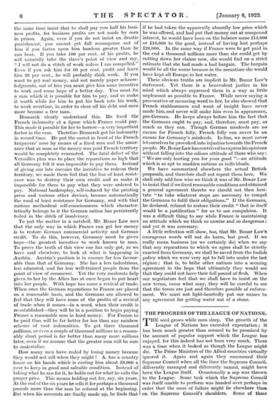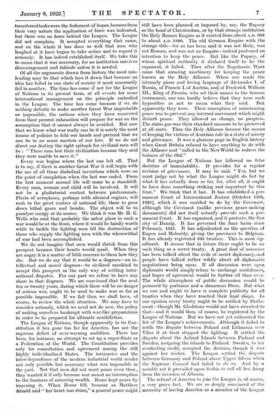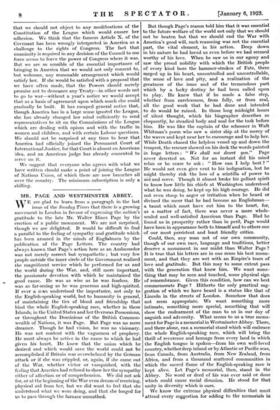THE PROGRESS OF THE LEAGUE OF NATIONS. T HE seed grows
while men sleep. The growth of the League of Nations has exceeded expectation ; it has been much greater than seemed to be promised by the amount of popular support which the League has enjoyed, for this indeed has not been very much. There was a time when it looked as though the League might die. The Prime Ministers of the Allied countries virtually ignored it. Again and again they summoned their Supreme Council when all the time the Supreme Council, differently managed and differently named, might have been the League itself. Occasionally a sop was thrown to the League. Some task which the Supreme Council was itself unable to perform was handed over perhaps in. order that the onus of failure might lie elsewhere than on the Supreme Council's shoulders. Some of these transferred tasks were the forlornest of hopes, because from their very nature the application of force was indicated, but there was no force behind the League. The League did not complain. It accepted everything that came, and on the whole it has done so well that men who laughed at it have begun to take notice and to regard it seriously. It has indeed established itself. We take this to mean that it was necessary, for no institution survives discouragement and ridicule unless it is needed.
Of all the arguments drawn from history the most mis- leading may be that which lays it down that because an idea has failed in one state of society it must necessarily fail in another. The time has come if not for the League of Nations in its present form, at all events for some international management on the principle embodied in the League. The time has come because if we do nothing definite to make another Great War improbable or impossible, the nations when they have recovered from their present exhaustion will prepare for war on the assumption that it cannot always be avoided. But now that we know what war really can be it is surely the most insane of policies to fold our hands and pretend that we can be in no sense masters of our fate. If we do not direct our destiny the right epitaph for civilized men will be : " These men lost their civilization because they said they were unable to save it."
Every war begins where the last one left off. That is to say, if there is another Great War it will begin with the use of all those diabolical inventions which were on the point of completion when the last war ended. From the first moment normal life will come to a standstill. Every man, woman and child will be involved. It will not be a gladiatorial contest between professionals. Fleets of aeroplanes, perhaps with silenced engines, will rush to the great centres of national life, there to pour down lethal gases and bombs. The object will be to paralyse energy at its source. We think it was Mr. H. G. Wells who said that probably the safest place in such a war would be at the front, where it would be hardly worth while to tackle the fighting men till the destruction of those who supply the fighting men with the wherewithal of war had been accomplished.
We do not imagine that men would shrink from this prospect because their hearts would quail. When they are angry it is a matter of little concern to them how they die. But we do say that it would be a disgrace—an in- tellectual and moral disgrace—to civilized mankind to accept this prospect as the only way of settling inter- national disputes. For our part we refuse to have any share in that disgrace. We are convinced that the next ten or twenty years, during which there will be no danger of serious war, ought to be used to make war so far as possible impossible. If we fail then we shall have, of course, to review the whole situation. We may have to consider seriously, which we need not do now, the policy of making ourselves bankrupt with war-Illce preparations in order to be prepared for ultimate annihilation.
The League of Nations, though apparently in its Con- stitution it has gone too far for America, has not the supreme defect of over-weening ambition. There has been, for instance, no attempt to set up a super-State or a Federation of the World. The Constitution provides only for consultation and agreement among the still highly individualized States. The intricacies and the inter-dependence of the modern industrial world render not only possible but necessary what was impossible in the past. Not that men did not want peace even then ; they wanted it if only because war meant an interruption to the business of amassing wealth. Rome kept peace by imposing it. When Rome fell, because as Matthew Arnold said " her heart was stone," a general peace night still have been planned or imposed by, say, the Papacy as'the head of Christendom, or by that strange institution the Holy Roman Empire as it existed from about A.D. 900 to about A.D. 1800. The old German Empire with the strange title—for as has been said it was not Holy, was not Roman, and was not an Empire—indeed professed an intention to keep the peace. But like the Papacy, of whose spiritual authority it declared itself to be the exponent, it failed. Then after the Napoleonic Wars came that amazing machinery for keeping the peace known as the Holy Alliance. When one reads the intensely pious and loving language of Alexander I. of Russia, of Francis I. of Austria, and of Frederick William III., King of Prussia, who set their names to the famous instrument, one can hardly believe that they were such hypocrites as not to mean what they said. But apparently they were. Their conception of maintaining peace was to prevent any internal movement which might disturb peace. They allowed no change, no progress. The status quo was their standard measure to be preserved at all costs. Thus the Holy Alliance became the means of keeping the victims of Austrian rule in a state of misery and grievance. It was a glorious page in English history when Great Britain refused to have anything to do with the Alliance and "called in the New World to redress the balance of the Old."
But the League of Nations has followed no false doctrine of immutability. It provides for a regular revision of grievances. It may be said, " Yes, but we must judge not by what the League might do but by what it has actually done so far, for, after all, it ought to have done something striking and important by this time." We think that it has. It has established a per- manent Court of International Justice (October 15th, 1921), which it was enabled to do by the Covenant, although the Covenant (unlike previous peace-making documents) did not itself actually provide such a per- manent Court. It has organized, and it protects, the free city of Danzig. It has governed the Saar basin since February, 1921. It has adjudicated on the question of Eupen and Malmkly, giving the provinces to Belgium. It has already registered 350 treaties. This is most sig- nificant. It means that in future there ought to be no such thing as a secret treaty. A great deal of nonsense has been talked about the evils of secret diplomacy, and people have talked rather wildly about all diplomatic negotiations being open. If all discussion were open diplomats would simply refuse to exchange confidences, and hopes of agreement would be further off than ever. The whole atmosphere of public discussion would be poisoned by partisans and a clamorous Press. But what we can and ought to have is complete publicity for all treaties when they have reached their final shape. In our opinion every treaty ought to be ratified by Parlia- ment—though Mr. Gladstone would not have assented to that—and it would then, of course, be registered by the League of Nations. But we have not yet exhausted the list of the League's achievements. Although it failed to settle the dispute between Poland and Lithuania over Vilna it at least stopped the fighting. It settled the dispute about the Aaland Islands between Finland and Sweden, assigning the islands to Finland. Sweden, to her everlasting credit, accepted the decision, though it was against her wishes. The League settled the dispute between Germany and Poland about Upper Silesia when the Supreme Council had failed to do so. And by a notable act it prevailed upon Serbia to call off her Army from the invasion of Albania.
The refusal of America to join the League is, of course, a very grave fact. We are so deeply convinced of the necessity of having America as a member of the League that we should not object to any modifications of the Constitution of the League which would ensure her adhesion. We think that the famous Article X. of the Covenant has been wrongly interpreted in America as a challenge to the rights of Congress. The fact that unanimity is required in any decision of the Council to use force seems to leave the power of Congress where it was. But we are so sensible of the essential importance of bringing in America that we would not only consent to, but welcome, any reasonable arrangement which would satisfy her. If she would be satisfied with a proposal that we have often made, that the Powers should merely promise not to denounce any Treaty—in other words not to go to war—without a year's notice we would accept that as a basis of agreement upon which much else could gradually be built. It has escaped general notice that, though America has in a large sense ignored the League, she has already changed her mind sufficiently to send representatives to sit on the Commissions of the League which are dealing with opium and with the traffic in women and children, and with certain Labour questions. We should not be surprised at any time to hear that America had officially joined the Permanent Court of International Justice, for that Court is almost an American idea, and an American judge has already consented to serve on it.
We suggest that everyone who agrees with what we have written should make a point of joining the League of Nations Union, of which there are now branches all over the country. The minimum subscription is only a shilling.




















































 Previous page
Previous page